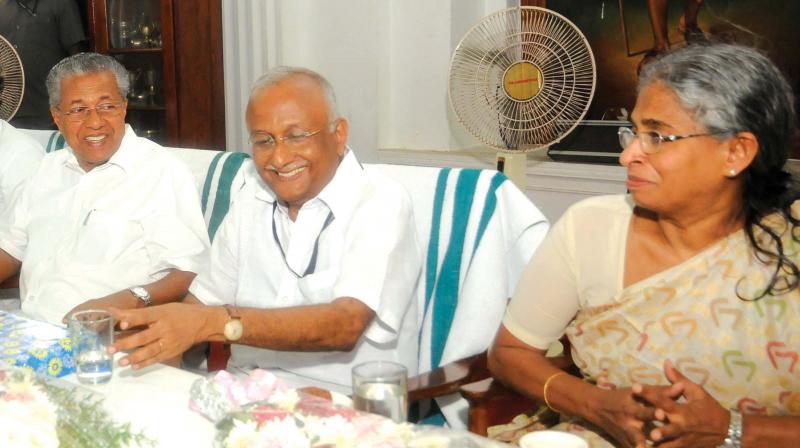Best officers not media darlings

The senior-most officers in the Kerala cadre of the IAS and the IPS were in the news yesterday. Chief Secretary S M Vijayanand retired from service after 36 years in the IAS, 'attaining the age of superannuation', in officialese. He has made significant contributions to the administration in several sectors, especially in rural development, tribal development and Panchayat Raj. Another senior officer who retired from the IAS yesterday was Mrs Sheela Thomas, a low profile but extremely competent officer. The senior-most IPS officer in the cadre is Mr T P Senkumar, whose Supreme Court case has been attracting attention. But the man at the centre of the news was the next in seniority, Mr Jacob Thomas, Director of Vigilance Investigation, who proceeded on a month's leave, with the media observing that he may not like to return to Government service. He was always in the news and had strong support from the social media for his professed war on corruption.
Unfortunately for him, he could not deliver results in 10 months of Vigilance work in spite of strong Government backing. He alienated the IAS/ IPS community in general and was himself the target of very serious allegations. What thoughts pass through the mind of an officer on the day of retirement? Looking back, my experience was that it was like any other working day, with hardly any time to sit back and recollect or even to plan your retirement speech. I retired from the post of Secretary of the Shipping Ministry in the Central Government. The last meeting I chaired was for awarding a ship-building work to Cochin Shipyard, based on a half-baked proposal, which I knew could be delayed or dropped if not finalised then. While working in the Central Government, one does not discriminate between States, but it gives a lot of satisfaction when something is done for your home State.
Actually the shock of retirement is felt on the first few days after retirement, when there is no focussed work to indulge in. Several officers get re-employed, full time or part time, depending on the nature of their job. Governments are often keen to retain services of some officers whose expertise and experience cannot be matched or substituted by others available in service. However, for generalist positions, which are constitutional or statutory, like the Comptroller and Auditor General, Election Commissioners, Information Commissioners and UPSC Members, the government of the day would want to appoint persons who they believe would be loyal to them; but these expectations of loyalty or gratitude seldom get fulfilled as the constitutional or statutory authorities would generally want to work in a free and fair manner, and they have no fear of removal.
During the Manmohan Singh days in Delhi, officialdom used to speak in hushed tones about the Ahmed Patel route to Mrs Sonia Gandhi's residence at 10, Janpath for the identified candidates. Why do bright young people toil devotedly to enter the civil services, and what are their aspirations? Perhaps, there is no single factor which entices the brightest of Indian youth to the civil services - it would be a combination of social commitment, perceived glamour, job security, power and authority, potential to be in the limelight, and several other factors - the weightage of each element varies from person to person. But all these thoughts or dreams are based on incomplete information; the stark realities are often very different from ideals visualised by youngsters before joining the Government.
How do you measure the success of a civil servant's career? Some officers get projected by the media - more often than not, the favourites of the media in Kerala are officers who make irresponsible statements or come out with unworkable but popular ideas or pick up a Quixotic fight with the Government or other authorities. There are of course righteous officers who choose to challenge the Government on certain principles, but these are confined to the note files and are not public knowledge. The best officers remain unknown; they abide by the Conduct Rules, they respect the system and work within it, even while striving to change the system for the better. And such karma is with a detached mind, unconcerned about personal benefits of their decisions or actions. There is a real world of committed public servants, who are invisible, doing their work in this fashion.
Perhaps the basic tools for the good civil servant are commitment and empathy. The realisation that you are paid from public money for doing their (not your) job, is very critical. It is also important to look at issues of another person from his perspective, not from yours alone. If an officer believes that s/he is the sole paragon of virtues, and that everyone else is the personification of evil, such an officer would be a liability for the Government and society. Perfectly virtuous heroes and viciously nefarious villains disappear even from the silver screen all too soon.
(The author is ex-Union Shipping Secretary)

